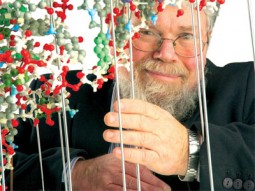News
Published 10 November 2010Molecular biologist Professor Warren Tate wins New Zealand’s top science and technology honour, the Rutherford Medal

New Zealand’s top science and technology honour, the 2010 Rutherford Medal, has been awarded to internationally renowned molecular biologist Professor Warren Tate FRSNZ from the University of Otago.
The Minister of Research, Science and Technology, Hon Dr Wayne Mapp, presented the Royal Society of New Zealand medal to Professor Tate at this year’s Research Honours celebration event in Christchurch on Wednesday night.
As the Rutherford medal winner, Professor Tate also receives $100,000 in award money from the Government.

The President of the Royal Society of New Zealand, Dr Garth Carnaby, says Professor Tate has had a ‘stellar career ‘which continues to flourish, with groundbreaking discoveries in understanding fundamental elements of cell biology.
“His work has made a huge contribution to health research with potential applications for preventing and treating HIV-1 and neurological diseases such as Alzheimer’s.
“Professor Tate’s research has revolutionised our understanding of how proteins are synthesised in living cells. This has had important implications for research looking at how proteins contribute to memory formation and neurological disease.”
“Professor Tate’s exceptional contributions extend well beyond the laboratory, with his teaching having inspired countless budding researchers. Many of his former students now have outstanding research careers both in New Zealand and internationally.
“He has also devoted considerable energy to science policy and funding, playing a prominent role nationally and internationally.”
Early in his research career Professor Tate discovered by chance a new mechanism for gene regulation, leading to a study of the mechanism in HIV-1 as a potential drug target.
In addition to his fundamental molecular biology research, he has been involved in a completely different research area, molecular neurobiology, looking at the molecular mechanisms of neurological diseases.
An interest in the molecular basis of memory has progressed to the development of brain protein fragment that can restore memory, and has potential as a therapeutic agent for Alzheimer's disease.
In very recent studies Professor Tate and his students have begun to investigate the molecular biology underlying chronic fatigue syndrome.
Professor Tate is a Fellow of the Royal Society of New Zealand and of the New Zealand Institute of Chemistry. He has been a Fellow of the Alexander von Humboldt Foundation of Germany, and an International Research Scholar of the Howard Hughes Medical Institute of the United States.
The Rutherford Medal was instituted in 1991 as the premier New Zealand science and technology award at the request of the New Zealand Government. The award is made by the Council of the Royal Society of New Zealand. The last ten recipients have been Professor Peter Hunter (2009), Professor David Parry (2008), Professor Richard Faull (2007), Professor Ted Baker (2006), Professor Sir Paul Callaghan (2005), Professor David Penny (2004), Professor George Petersen (2003), Professor Jeffrey Tallon (2002), Professor Sir Peter Gluckman (2001) and Professor Alan MacDiarmid (2000).
